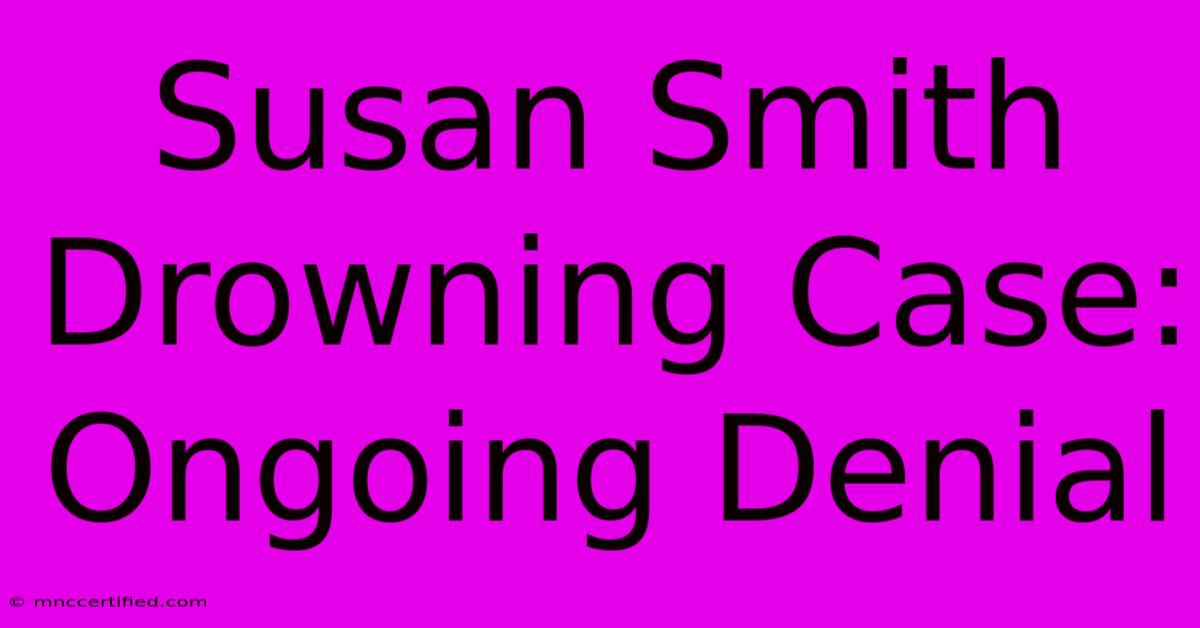Susan Smith Drowning Case: Ongoing Denial

Table of Contents
Susan Smith Drowning Case: The Enduring Enigma of Denial
The Susan Smith case, a chilling tale of matricide and deception, continues to fascinate and horrify decades after the tragic events of October 1994. While Smith's guilt was established beyond a reasonable doubt, her unwavering denial of premeditation and her shifting narratives surrounding the drowning deaths of her two young sons, Michael and Alex, remain a compelling psychological study and a testament to the complexities of human behavior. This article delves into the enduring enigma of Susan Smith's denial, exploring its potential roots and implications.
The Crime and the Confession
On October 25, 1994, Susan Smith reported her car stolen, claiming that a Black man had abducted her sons, Michael (3) and Alex (14 months). This sparked a massive manhunt. The ensuing days were filled with intense media scrutiny, with Smith appearing on television, tearfully pleading for her children's safe return. However, this carefully crafted performance ultimately crumbled. Days later, under intense pressure and interrogation, Smith confessed to intentionally drowning her children in a lake. She claimed she did so because of relationship problems with her boyfriend and her fear that he wouldn't accept her children.
The Layers of Susan Smith's Denial
Smith's confession, while acknowledging her actions, didn't fully encompass the premeditation and cold-blooded nature of the crime. This reveals layers of denial:
1. Denial of Premeditation:
Smith consistently attempted to portray the act as impulsive, a moment of weakness brought on by stress and despair. She never fully accepted the weight of her decision-making process leading up to the crime, minimizing the planning and execution involved. This is a classic form of denial, where the individual avoids confronting the full implications of their actions.
2. Shifting Narratives and Minimization:
Throughout the investigation and subsequent trial, Smith's story changed. She initially blamed a Black man, a fabrication aimed at diverting attention and potentially invoking racial prejudice. Later, even after confession, she minimized her culpability, presenting herself as a victim of circumstance rather than a perpetrator of a heinous crime. This minimizing behavior is a common characteristic of individuals struggling to cope with the consequences of their actions.
3. Denial of Responsibility:
Even after her conviction, Smith continued to maintain a level of denial regarding her responsibility for the deaths of her children. She expressed remorse, but it wasn't a complete acknowledgment of her deliberate and malicious intent. She consistently shifted the blame, pointing to external factors and emotional distress, rather than accepting full ownership of her actions.
Psychological Interpretations of Susan Smith's Denial
Experts offer several possible psychological interpretations for Susan Smith's enduring denial:
-
Dissociation: Trauma and severe emotional distress can lead to dissociation, a defense mechanism where the individual mentally separates themselves from the reality of their actions. This could explain the disconnect between Smith's actions and her perceived emotional state.
-
Narcissistic Personality Traits: Some analysts have suggested narcissistic personality traits, characterized by a lack of empathy and an inflated sense of self-importance, might have contributed to her inability to fully accept responsibility.
-
Avoidance of Guilt and Shame: The overwhelming guilt and shame associated with her actions might have been so unbearable that denial served as a crucial coping mechanism. Confessing fully would have required confronting the magnitude of her cruelty.
The Lasting Impact
The Susan Smith case remains a chilling reminder of the devastating consequences of unchecked mental health issues and the complexities of human behavior. Her persistent denial, while deplorable, highlights the enduring power of self-deception and the intricate ways individuals cope with profound guilt and trauma. It serves as a potent case study for psychologists, criminologists, and anyone seeking to understand the dark side of human nature and the enduring power of denial in the face of overwhelming evidence. The ongoing debate surrounding the psychological underpinnings of her actions underscores the need for a deeper understanding of the factors that contribute to extreme violence and the challenges involved in achieving genuine remorse and accountability.

Thank you for visiting our website wich cover about Susan Smith Drowning Case: Ongoing Denial. We hope the information provided has been useful to you. Feel free to contact us if you have any questions or need further assistance. See you next time and dont miss to bookmark.
Featured Posts
-
I Dont Know Today Show Host
Nov 21, 2024
-
Russia Fires Missile Into Ukraine
Nov 21, 2024
-
Shaboozey Name Cma Awards Jokes
Nov 21, 2024
-
Sirius America Insurance Company
Nov 21, 2024
-
Group Health Insurance Covina Ca
Nov 21, 2024